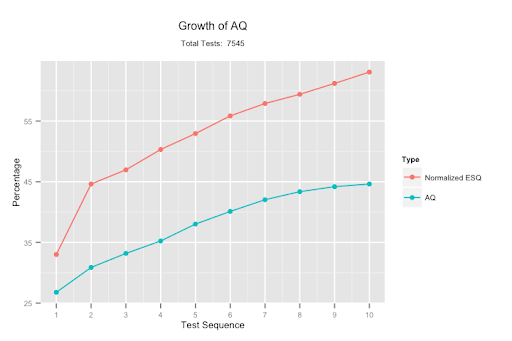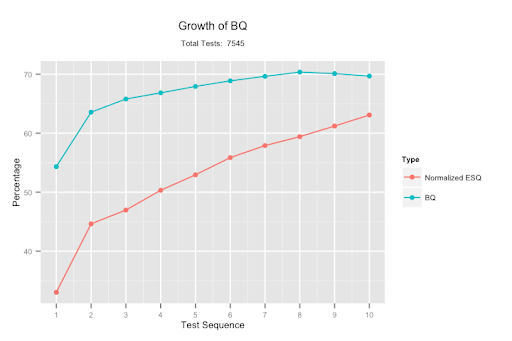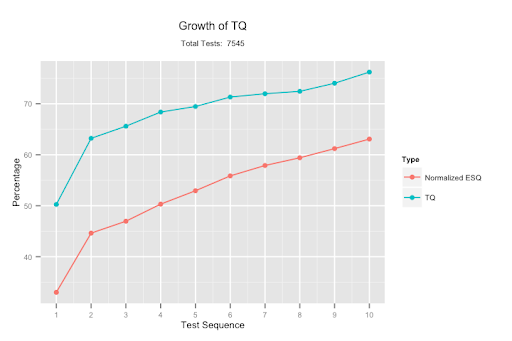We believe measurability lies at the heart of improvement — what can be measured can be improved. Embibe Score Quotient is a numeric parameter that captures a student’s ability to score in an exam. The Embibe Sqore Quotient has the following characteristics:
- Reflective: Embibe Score Quotient should reflect a student’s potential based on latent attributes of the student’s performance.
- Predictive: It should be predictive based on the current trend of a student’s performance.
- Robust: A bad or good test should not adversely impact a student’s Score Quotient.
- Normalised: It should be normalised to factor in varying test difficulty levels.
Embibe has developed an algorithm to compute a student’s Score Quotient by deriving parameters using the following considerations:
- Latent Attributes: Latent attributes or features make the Embibe Score Quotient reflect a student’s inherent ability. These latent attributes are derived from attempt-level event data captured on the platform as students take tests and practice sessions.
- Best Sessions: Considering N best test and/or practice sessions, where N is configurable, makes the Embibe Score Quotient reflective and robust to outliers in student performance. Further, the harmonic progression decays the importance weighting from high- to low-scoring sessions.
- Recent Sessions: Considering a moving window of the last K tests and/or practice sessions makes the Embibe Score Quotient predictive and also reflective of current student potential. If the normalised session score shows an upward trend after each session, the student will likely perform well in the near future too.
The Embibe Score Quotient is projected onto three orthogonal axes — Academic, Behavioural, and Test-taking. These different axes capture groupings of a student’s latent attributes over academic ability, behavioural quotient, and test-taking skills.
Embibe Score Quotient ~ Academic Quotient + Behavioural Quotient + Test-taking Quotient
For the study covered in this article, we have considered tens of thousands of good test sessions over many academic seasons. A test session is valid only if a student has spent some minimum threshold time and attempted a minimum number of questions.
Academic Quotient deals with subject knowledge. Students can improve their Academic Quotient in consecutive tests by working on hyper-personalised learning feedback – a form of academic recommendations delivered as personalised practice packs containing high-impact questions tailored to a student’s academic weaknesses. As a result, Academic Quotient has steady improvement, as seen in Figure 1.

Figure 1: Embibe Score Quotient Vs Academic Quotient Improvement
Behaviour Quotient deals with student intent — how motivated, attentive, and committed a student is to score higher. Embibe helps students improve their Behavioural Quotient by first determining the behavioural traits of users and then setting up progressive goals for incremental improvement [1]. Once a student knows where he is lacking in his latent behavioural intent, he can improve his Behavioural Quotient by being conscious of it. As shown in Figure 2, initial behavioural improvement happens very fast, and afterwards, there is a slower but steady improvement after each consecutive test.

Figure 2: Embibe Score Quotient Vs Behavioural Quotient Improvement
Test-taking Quotient deals with time management and prioritising questions to answer in a test session. Improving the Test-taking Quotient naturally improves Embibe Score Quotient as better test-taking strategies maximise learning outcomes. As can be seen in Figure 3, improvement in the Test-taking Quotient is high initially, followed by slower but steady growth.

Figure 3: Embibe Score Quotient Vs Test-taking Quotient Improvement
Breaking down the Embibe Score Quotient into Academic, Behavioural and Test-taking Quotients enables effective recommendations to bring learning outcomes.
References:
- Faldu K., Thomas A., Donda C. and Avasthi A., “Behavioural nudges that work for learning outcomes”, Data Science Lab, Embibe, https://www.embibe.com/ai-detail?id=2, 2016.
- Faldu, K., Avasthi, A. and Thomas, A., Indiavidual Learning Pvt Ltd, 2020. Adaptive learning machine for score improvement and parts thereof. U.S. Patent 10,854,099.
- Donda, C., Dasgupta, S., Dhavala, S. S., Faldu, K., & Avasthi, A. (2020). A framework for predicting, interpreting, and improving Learning Outcomes. arXiv preprint arXiv:2010.02629.

























